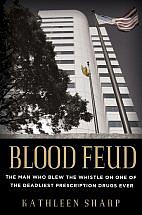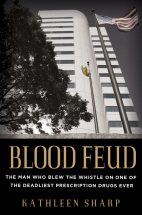Excerpt: Blood Feud: The Man Who Blew the Whistle on One of the Deadliest Prescription Drugs Ever

From Blood Feud: The Man Who Blew the Whistle on One of the Deadliest Prescription Drugs Ever by Kathleen Sharp (Dutton Books, 2011)
(Here, our sources Duxbury and McClellan attend a Wild West sales trip to reward their Procrit sales efforts.)
 A line of buses pulled to a stop on the back side of the Santa Catalina Mountains, behind the El Conquistador, and disgorged about a hundred pharmaceutical salespeople amid the dust, exhaust, and diesel fumes. Once the air cleared, Duxbury, McClellan, and their friends smiled. They were all dressed casually and several people wore Western gear of Levi's, Tony Lama boots, Stetsons, and bandannas. The group was corralled toward an open bar and barbecue grill, where the grease of red meat splattered onto hot coals. An organizer welcomed them with trays of cold drinks and announced that, after the cookout, they'd move to the shooting range for the highlight of the evening, a quick-draw contest. The crowd buzzed over the prospect of a Wild West gun-slinging competition.
A line of buses pulled to a stop on the back side of the Santa Catalina Mountains, behind the El Conquistador, and disgorged about a hundred pharmaceutical salespeople amid the dust, exhaust, and diesel fumes. Once the air cleared, Duxbury, McClellan, and their friends smiled. They were all dressed casually and several people wore Western gear of Levi's, Tony Lama boots, Stetsons, and bandannas. The group was corralled toward an open bar and barbecue grill, where the grease of red meat splattered onto hot coals. An organizer welcomed them with trays of cold drinks and announced that, after the cookout, they'd move to the shooting range for the highlight of the evening, a quick-draw contest. The crowd buzzed over the prospect of a Wild West gun-slinging competition.
Contestants were given authentic holsters to wear. The leather sat low on the hip and angled down on one side where the gun hung. The bottom of the holster had a rawhide thong that tied around the thigh, so that when you drew your gun, your holster would remain in place. Organizers handed out real Colt Single Action Army revolvers, which had been the weapon of choice in the West since the 1870s, when the Colt SAA was introduced. Some called the guns Peacemakers, but Duxbury preferred the term Equalizer because "having a Colt on your hip made you equal to any man." They had cylinders that tilted out of the frame for loading, but these revolvers held not real bullets but blanks. "When I shoot, I like to make sure I hit something," Duxbury complained.
"Like a sales target?" someone ribbed, and his circle burst out laughing.
"I'm trained for accuracy, not speed," he replied good-naturedly. On occasion, he'd spend a Sunday afternoon at a firing range, shooting five hundred rounds of ammo. But he didn't perform well in quick-draw contests, which would be clear soon enough. He, McClellan, and the others grabbed some drinks while they eyed the juicy steaks on the grill. Here was a chuckwagon buffet as envisioned by corporate team builders: smooth wooden benches arranged around tables of checkered cloth; lanterns propped up on boulders and stumps; aluminum pots of steaming buffalo chili, cowboy beans, and Indian fry bread. After dinner, the crowd was divided according to region, then split further into districts. Each team faced off against another, and after a few rounds, the Seattle District was eliminated, much to Duxbury's relief. "Now I can sit back and enjoy the show." It was at times like these that Duxbury reveled in the emotionally satisfying bond of his fellow reps. Lone-star sales folks and deputized detailers could face off against one another in lighthearted diversions that didn't threaten the other's survival. As Duxbury looked around, he saw J&J's drug distributors thoroughly enjoying themselves on the edge of the Mexican border, drinking, singing, and shooting pistolas into the clear night.
McClellan, meanwhile, was on his fourth drink when he took another turn. Each shooter had to wait for a light to appear; that was the signal to pull the trigger. The pistols were single action, meaning that you had to pull the hammer back to cock the gun while you drew it from the holster, then fire when the muzzle was aligned with its target. Dueling against McClellan was his boss, Dwayne Marlowe, who at one point handed the rep yet another drink, hoping that more liquor would skewer his aim. McClellan cheerily accepted the cocktail, took a sip, drew his gun, and hit the cardboard bull's-eye. "Ah," the crowd exclaimed, not quite believing what it just seen. Marlowe seemed to be getting mad: The more McClellan drank, the faster he drew. Pretty soon it was just the two of them standing in the dirt, McClellan and Marlowe, going mano a mano. The boss stopped, got himself a glass of water, and brought his opponent another gin and tonic, his sixth drink of the night. Each man gulped from his glass and waited. The green light flashed and Marlowe drew. But by that time, McClellan had already pulled his gun out of the holster, cocked the hammer, aimed, and fired. He hit the target dead center in 0.48 of a second, less than a half a second, beating his boss by a long shot and winning the evening contest. The crowd erupted in cheers, and Duxbury ran over to shake his buddy's hand. McClellan took home a bronze plaque-and Marlowe's enmity.
Read more about Blood Feud: How I Turned My Health Journalism Fellowship Into A Book Deal

